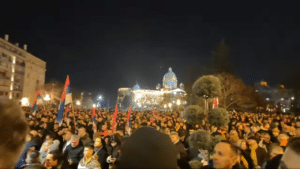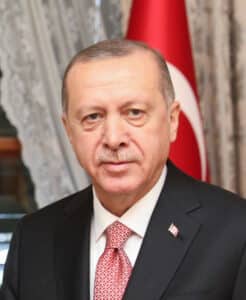Almost a year after the whole world went into lockdown, most countries are still struggling to handle the COVID-19 pandemic. Although the vaccine is a light at the end of the tunnel, it is clear that the world has been forever changed by the global pandemic. In (South) Eastern Europe, the Middle East and North Africa the COVID-19 pandemic has brought challenges for democracy, human rights, rule of law and freedom of press. Lockdowns and state of emergency-declarations have allowed leaders to erode already fragile democracies.
Social media surveillance and deepened autocratic rule in Turkey
In Turkey, the COVID-19 pandemic has enabled the government to deepen autocratic rule, silence critics and rapidly pass new laws to limit dissent. According to Human Rights Watch, the pandemic has become a way for the Erdogan government to double down on autocratic rule. In a way, the pandemic was used as an excuse for the already oppressive government to do things it had long planned to do.
Before the pandemic, the Turkish authorities were already known for arresting journalists on dubious claims. After the pandemic started, authorities have arrested journalists for reporting on coronavirus cases in their area under the claim of ‘sowing panic and fear.’ In addition, between March and May, 510 people in Turkey were reported to have been detained for questioning on account of “sharing provocative coronavirus posts” on social media, in violation of their right to freedom of expression.
During the summer, the Turkish government has pushed through legislation to regulate social media more strictly and impose large fines and bandwidth reductions on companies that do not comply with government demands. The law can be seen as president Erdogan’s latest attempt to silence his critics. The law has already been used to arrest people on the grounds of making ‘unfound and provocative’ posts that ‘cause worry among the public, incite them to fear, panic and target persons and institutions.’
Besides limiting freedom of press and freedom of speech, minorities have had their rights limited in Turkey. According to Human Rights Watch, police violence under the cover of COVID-19 had disproportionately targeted minorities. Along with this, the inability to conduct physical meetings has negatively influenced outreach work in places in Turkey where not everyone has access to the internet.
Attempts to limit press freedom and false infection rate numbers in Serbia
In Serbia, the authorities have also tried to limit freedom of expression by adopting a decree in March that centralized pandemic information flows in Belgrade and made journalists liable for prosecution for the “use of unofficial sources.” Although the decree was withdrawn two days later, it shows the government’s intention. According to the Independent Journalist Association of Serbia, there have been increased attacks on journalists.
Aside from the pressure on the freedom of press, the judicial system has also been under pressure. Although Serbia has been working on judicial reform, politicians and public figures still publicly comment on ongoing cases, putting pressure on courts and the individuals involved. During the state of emergency Serbia declared at the start of the pandemic, trials were conducted through video link, sometimes even without the presence of defense attorneys. Conducting trials online made it more difficult to ensure the transparency of the court proceedings.
After a month-long lockdown, Serbia opened up again and after reportedly low case numbers of people infected with the virus president Vucic claimed to have defeated it. Up until the elections in June, Serbia was open again. The Serbian government used false infection rate numbers in the lead up to the election, to secure an advantage. When the government announced a new, tough curfew in July, protests erupted in Belgrade as Vucic framed the protests as anti-lockdown riots. This shows how the Serbian government blamed the COVID-19 measures for the protests.
Limiting fundamental freedoms across (South) Eastern Europe and North Africa
Other countries have used similar tactics to Serbia and Turkey to use the pandemic to shut down opposition voices. Most frequently countries have tried to limit freedom of press or freedom of expression. For example, in both Morocco and Armenia social media users have been arrested on accounts of spreading “disinformation.” Other countries have merely made it more difficult to obtain information, like in Lebanon, where journalists were required to get special permits to move around during lockdown.
Besides, the COVID-19 measures are often used to repress political opponents. In Egypt, the regime has used COVID-19 to repress political activists, journalists, lawyers and doctors, arresting dozens and placing several on terrorist lists. Likewise, Azerbaijan has used the pretext of ‘breaking quarantine’ to crack down on opposition political activists. In Montenegro, the government labeled any protest attempts by religious groups as reckless attempts to spread the virus, limiting their freedom to protest.
Although it may seem as if this is the only way for weak democracies, there are countries that show that it is possible to handle the coronavirus pandemic respectably. According to the Freedom House report “Democracy under Lockdown,” which was based on research between March and September 2020, Tunisia and Georgia managed to handle the coronavirus pandemic without limiting fundamental rights. In Tunisia, the authorities refrained from any serious infringements on fundamental freedoms, and in Georgia, the government was commended for imposing strict but transparent measures to tackle the pandemic. Moving forward, it is to hope that more countries choose the path of transparency, safeguarding human rights, freedom of press and freedom of religion.
Sources: Freedom House, the Diplomat, EEAS, Idea, Balkan Insight, Civicus, RSF, EWB, Aljazeera
Photo: Unsplash



